- Home
- Lin Carter
Eric of Zanthodon Page 2
Eric of Zanthodon Read online
Page 2
I do not know, and this is no place to inquire into such arcane matters. But one of the boats, freed of its mooring, had been carried a ways off down the shore, and lay floating in the shallows some considerable distance away from where the huge lumbering gorgorog browsed.
Kairadine transferred his wriggling feminine burden to one broad shoulder, and crept through the trees, emerging from the cover of the trees at the point where the floating longboat was closest to the shoreline.
I suppose it was the plan of the Pirate Prince to board the boat, deposit his wriggling burden aft, and row her out to where the Barbary ship was anchored.
It was as good a plan as Kairadine could have devised, given the circumstances.
But not quite good enough.
For the stealthy figure of the turbaned corsair with the half-naked blonde woman across one shoulder caught the glazed, indifferent eye of the brontosaurus.
Through what passed for its brain-a miniscule, atrophied organ probably no longer than a peanut-there flickered a gleam of idle curiosity.
Doubtless, never before in all its days had the monster reptile seen a bearded, swarthy man in brilliantly colorful silk pantaloons slinking along the beach with a struggling goldenhaired woman across one shoulder and a saber flashing in one gemmed fist.
Mild wonderment entered the gaze of the placid reptile. Its endless appetite momentarily lulled to repletion by the sea-salad which had served as its luncheon, the brontosaurus decided to investigate. A casual stroll along the beach, after all, is good for the digestion after a hearty meal.
Over his shoulder, Kairadine looked and saw the great lumbering monster heading for him. Growling a curse, he turned on his heel and sprinted farther up the beach, away from where the empty long-boat bobbed up and down, so tantalizingly close.
At a leisurely pace, which shook the ground underfoot only slightly, the six-hundred-ton dinosaur followed inquiringly.
Soon both the pursuer and the pursued were far down the beach and out of sight.
Chapter 3. HUROK HAS A PROBLEM
While these things had been taking place, the battle had collapsed into a vast, noisy mob of confused, bewildered, leaderless men-in which only the Cro-Magnon warriors managed to keep their wits about them and press their advantage.
The corsairs had lost many of their number while trying to attack from the front and defend themselves from the rear. When Kairadine Redbeard had vanished from their midst, many had lost heart and prudently flung down their weapons to take to their heels. Moustapha could do little or nothing about this, since even the leader of a host cannot be everywhere at once.
As for the Zarian legion, once their impetuous Empress had hurled herself into the van, only to disappear as if the earth had opened to swallow her up, they, too, fell into a demoralized disarray, which was only aggravated further with the discovery that the second-in-command, the nefarious Xask, had also mysteriously disappeared.
The Cro-Magnon tribe, augmented by the timely arrival of mighty Tharn of Thandar and his own host of warriors, found little difficulty in achieving the victory. The Barbary Pirates and the men of the lost colony of Minoan Crete, already deserting in droves, now flung down their weapons and sullenly surrendered.
Garth of Sothar and Tharn of Thandar, not wishing to needlessly encumber themselves with such a host of prisoners, simply confiscated and surrendered arms and let the captives go. Perhaps the defeated warriors would fall prey to the monstrous prehistoric beasts that roamed the wilderness, perhaps they would, after long wanderings, manage to find their way safely back again to their homelands. That was up to them, and, for their part, the Pirates and the Zarians departed hastily from the scene of their defeat.
The women and children, the aged and the injured, the twin tribes had sent through the mountain pass to the relative safety of the southern plains. Now heavily armed with sophisticated weapons of edged metal taken from the Barbary Pirates and the men of Zar, the fighting men of the tribes wasted no time in crossing the Peaks of Peril and rejoining those that had gone before.
We made our camp on the plains of the south and rested and ate and took care of our wounds. Also, the chieftains conferred in council as to future courses of action.
“With the recovery of the gomad Darya, your daughter, my brother,” said Garth of Sothar, “no further reason exists to keep you and yours from returning to your homeland.”
Tharn solemnly agreed. He said: “My only remaining wish could be that your own daughter, the gomad Yualla, had survived the perils of the north, so that you could rejoice in the recovery of your child as I do in the recovery of my own.”
Garth thanked his fellow monarch for the sentiment, and said nothing further on this subject. At this time, my reader will understand, none of us had any way of knowing that Yualla still lived, or that young Jorn the Hunter had survived his dive into the mountain lake.
Once we were fed and rested and had bound our wounds, we departed, to cross the plain and enter the jungles. As explained earlier in these memoirs, the tribe of Sothar were homeless, for their country had been devastated by earthquake and volcanic eruption, precipitating them into hasty flight, followed by long wanderings. The two tribes had joined together out of a desire for the mutual protection afforded by numbers; since then, they had become close friends, and Tharn had offered them room in his country for their living places, for the forested plains of Thandar were broad and much land lay empty.
So the host that headed south into the jungles was far more numerous than the host that had originally marched north on the trail of the lost Princess Darya.
And to this number had also been added the many slaves who had fled with the Professor and me when the mad god, Zorgazon, had destroyed the Scarlet City of Zar. These were men taken by the Zarian slavers from other scattered Cro-Magnon tribes which inhabited the little-known northern parts of the subterranean continent. Tharn and Garth had offered them a place among us, which they had gratefully accepted.
Several of them, in fact, had volunteered to join my own company of warriors, for I had become a chieftain high in the councils of the twin tribes. Among these were my stalwart friends, cheerful, merry-hearted Thon of Numitor and that stolid but faithful giant, Gundar of Gorad, who had become my friends during the time we were penned up in the Pits of Zar, awaiting the Great Games of the God.
Also among my company were gallant Varak and his mate, Ialys of Zar, who had fled with us, and Grond of Gorthak and little Jaira, his mate, who had been slaves in the island fortress of El-Cazar.
These, together with the other warriors of my company, such as mighty Hurok of Kor, had swelled the numbers in my service until we jestingly described ourselves as a miniature tribe, not just a company.
Each company seeks its own camping place, and lights its own cook-fires, and marches together. Hence, as we entered the edges of the jungle, we were a little apart from the others and forced to make our own path through the dense undergrowth and heavy foliage.
I was in the lead, of course, with Hurok the Neanderthal on my right hand, and Gundar on my left. The Cro-Magnon gladiator was the only panjani (as the Neanderthal Apemen of Kor refer to us) who could compare, in bulk and breadth of shoulder, in sheer physical might, to my old comrade Hurok, and venturing into the jungle I felt more comfortable with these two stalwarts at my side.
These jungles have many denizens, and among them are some of the most feared and savage beasts that ever roamed the upper world, the lumbering grymp, or triceratops, the vandar, as the Cro-Magnons name the dreaded sabertooth tiger, and the goroth (or prehistoric bull, known as the aurochs to science) are among these, and not the least among them, as you can imagine.
But the commotion made by the entry into the jungle country of such a host of warriors and their women, numbering over a thousand by now, drove even the more ferocious predators into hiding-a fact for which we all had cause to be thankful.
Still and all, we trod the jungle
aisles warily, senses alert for the slightest sign of danger, weapons bared and ready in-After a time, I began to notice that Hurok seemed unusually somber and silent, even for one given to few words. I glanced at the burly form of my friend curiously. Finally I spoke up.
“Why are you so silent, Hurok?” I asked. “Is anything bothering you in particular?”
“There is a certain matter on Hurok’s mind,” admitted the Apeman of Kor in his slow, deep voice, “but naught that concerns his friend Black Hair.”
“Anything that worries the mind of Hurok, worries his friend Black Hair,” I said. “For Black Hair and Hurok of Kor are more than friends: they are brothers.”
A gleam of pleasure momentarily brightened the small, dull eyes, buried under heavy neanderthaloid brow-ridges. Then it was gone, but I knew it for his version of a smile.
“Perhaps at a later time,” he said heavily, “Hurok the Drugar will apprise Black Hair the panjani of that which is in his heart.”
I was troubled by these words, and did not like the sound of them. For one thing, “Drugar” is the word by which the Cro-Magnons call the Apeman of Kor, and it is more or less to be considered a derogatory term. “Panjani” is the word the Apemen of Kor use for the Cro-Magnons: it means “smooth-skins.”
It bothered me that Hurok employed these terms. I could remember earlier occasions when he found himself unwelcome among the fighting men of Thandar because of his race, which they have good reason to detest. Neanderthal and Cro-Magnon have been at war since first their remotest ancestors found their way into the hidden cavern world of Zanthodon, and they remain blood foes to this day. But Hurok had long since earned the respect and the friendship of the Cro-Magnon comrades by whose side he had fought many battles and braved the perils of the wilderness.
I said nothing more, assuming that in his own good time, my huge, hairy friend would unburden his heart to me.
And made thereby a mistake I later had cause to regret … . one, if I may say so, among very many!
The misty-golden skies of Zanthodon know neither sun nor moon, neither night nor day. A perpetual late-afternoon light illuminates the humid atmosphere of the Underground World, under the vast curve of its cavernous roof. This mysterious luminescence, which derives neither from sun nor moon nor stars, is belived to be caused by some chemical action akin to phosphorescence.
Lacking sun and moon, the men and women of Zanthodon know neither day nor night. Unaware of these divisions of time, they tend to sleep whenever they become sleepy, and to awaken when they are sufficiently rested.
After we had cut our way through the thick jungles below the plain of the thantors for what must have been many hours, weariness overcame us, and the desire for sleep.
Each company of warriors chose its own ground and posted its own sentinels. Hurok volunteered to take the first watch, with no particular reason; I think I assumed the glum old fellow wished to be alone with his thoughts.
When we awoke, he was gone.
Chapter 4. XASK RUNS INTO TROUBLE
When the great cave bear came rearing up on its hind legs and burst into a lumbering charge, Jorn and Yualla sprang from their places of concealment in the tall grass.
Since there was no way of fighting the monster with the weapons they held, their only recourse lay in flight. For the Cro-Magnon youngsters were young and lithe and swiftfooted, and could easily outrun the shaggy ponderous brute.
Instinctively, they took opposite directions so as to confuse the beast and make him pause to consider which fleeing youngster to pursue. Not looking back, they raced off into the plain.
The omodon paused uncertainly, peering with small, weak eyes after the two escaping morsels, growling hungrily, trying to make up what passed for its mind.
This was the scene which confronted Xask and Murg and the six guards when they came pelting up to the spot from which the uld had scattered. The Zarians came to a stumbling halt, staring at the shaggy monster. At its full height, the omodon towered twenty feet high, and seemed a veritable ogre to the small slightly-built legion warriors. Spying them, it opened an enormous fanged maw, roared its angry challenge, and came charging down upon them with an earthshaking stride.
In no time it was among them, hammer-heavy paws batting them aside. One guard went flying, his skull shattered. Another staggered back, pawing at the gory ruin of its face, slashed to ribbons with one swipe of the bear’s huge, fearsomely armed paw. A third screamed and fell, disemboweled at a stroke.
Only one guard stood and faced the lumbering hill of fury muscle that came thundering down upon him.
He thrust with a lightning-swift stroke, sinking the keen points of his metal trident in the bear’s belly.
Instead of felling or even slowing the cave-bear, the wound only seemed to infuriate him.
He caught up the guard in the grip of those great paws.
And bit his head off.
That was enough for Xask! Without further ado, watching his guards fall before the angry brute, the prudent vizier turned and took to his heels.
Murg hovered indecisively, squeaking, licking dry lips with a dry tongue. Then he took off in the same direction Xask had taken. A tall stand of trees stood in the midst of the plain, some distance away; it was the only thing in sight that might afford a safe haven, and toward it Xask had instinctively fled.
Murg followed.
Seeing its fleet-footed prey vanish in the distance, the bear grunted sourly. It quickly dispatched the last of the guards, then squatted on its hunkers to regard the gore-splashed corpses strewn and sprawled about amid the trampled grasses.
Most bears in the upper world prefer fat grubs, insects or leafy vegetation. The great cave-bear of the Ice Age, however, was less fussy in its tastes, and had developed a hearty fondness for raw meat.
Dragging the nearer corpse over to where it squatted, the bear sniffed at the bloody thing. It vastly preferred the timid, tasty uld-man-meat was stringy and sour. Still and all, hunters cannot be choosers.
It began to feed … .
After about an hour, Yualla caught up with Jorn, having left the omodon far behind, finishing its meal.
Neither of the young people was even winded by the rapid pace they had maintained across the plain, but it was good to pause and rest a little. They found a sheltered pool, nestled in the shoulder of one of the foothills of the Peaks of Peril, and satisfied their thirst therein.
Their flight from the cave-bear had carried them far into the midst of the plain, where it bordered the range of gray peaks. They were, in fact, near to the point at which the mountains petered out, diminishing into hills and hummocks.
While they rested, they discussed the situation.
“There is no point in retracing our steps to the scene of battle, for by this time our people have either won or lost the contest,” remarked Jorn thoughtfully.
“They will have sent the women and children, the aged and the injured, through the pass to the safety of the far side of the mountains,” Yualla said.
“It would be a lot easier to circle the end of the range here and rejoin the survivors on the other side,“ murmured Jorn.
Yualla agreed with his choice of actions. Taking up their weapons, the two Cro-Magnon youngsters began making their way through the foothills at the end of the mountain range. They traced a path through narrow, rocky defiles, a mazelike labyrinth, which consumed much more time than it should.
Jorn and Yualla were alert for danger. These mountains were the haunts of many dangerous beasts, among whom the omodon was but one. Sabertooth tigers made their rocky lairs in the flanks of the mountains, and upon the summit of the peaks thakdols nested.
Having once been carried off by a hungry thakdol, Yualla had no particular wish to repeat the experience.
The thakdol is the bat-winged flying reptile the scientists of the Upper World call the pterodactyl, so you can imagine how the cavegirl felt.
The Peaks of Peril,
you see, were aptly named … .
Whatever gods watch over the wandering adventurers of Zanthodon seemed to have taken the Cro-Magnon couple under their care, for despite the numerous savage denizens of the Peaks of Peril, Jorn and Yualla encountered no further dangers during their journey through the hills.
Before the world was very much older, they found themselves on the southern side of the mountains, and saw before them the broad and level plain of the thantors, and, beyond these, the dark edges of the jungle country.
For a time they went along the flanks of the mountains, heading back in the direction from which they had fled. At length weariness overcame them and they prepared to sleep. They had also, by this time, developed hearty appetites-young Cro-Magnons being no different in that wise than the young people of the Upper World.
Since no game surfaced to visibility, there was nothing to do about their hunger except to attempt to forget it and seize the opportunity to sleep.
Finding a cozy nook among the rocks, they rolled up the long, dry grasses into a soft bed, and composed themselves for slumber.
Jorn was acutely aware of Yualla’s nearness. He had fallen in love with the pretty Cro-Magnon maid during their adventures together, and young blood ran hot in his healthy body. But he tried to ignore the tempting nearness and pretend he did not feel the desires that surged within him.
The Cro-Magnons, our remote ancestors, enjoyed a simpler and less complicated code of behavior than the cumbersome system of laws and restrictions our modern urban civilization imposes. They bare their bodies before members of the opposite sex indifferently, uncaringly, but when they mate it is a serious commitment for life.

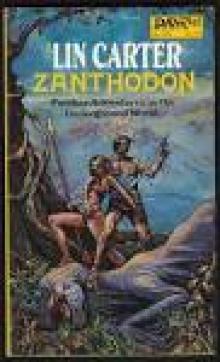 Zanthodon
Zanthodon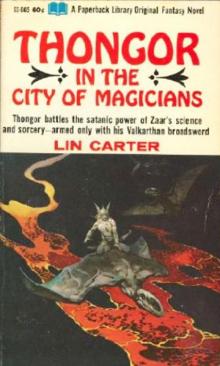 Thongor in the City of Magicians
Thongor in the City of Magicians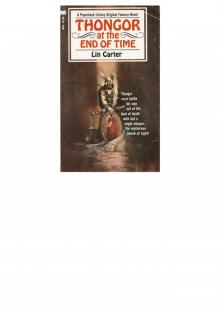 Thongor at the End of Time
Thongor at the End of Time The Valley Where Time Stood Still
The Valley Where Time Stood Still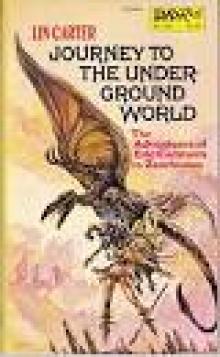 Journey To The Underground World
Journey To The Underground World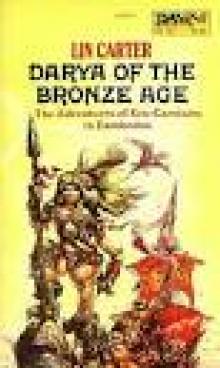 Darya of The Bronze Age
Darya of The Bronze Age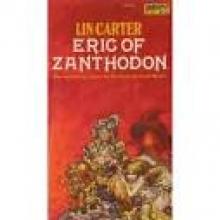 Eric of Zanthodon
Eric of Zanthodon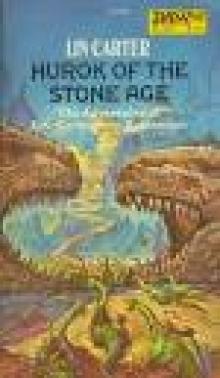 Hurok Of The Stone Age
Hurok Of The Stone Age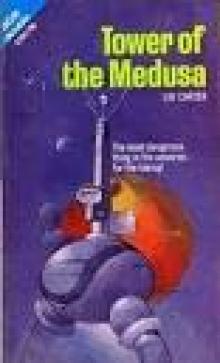 Tower Of The Medusa
Tower Of The Medusa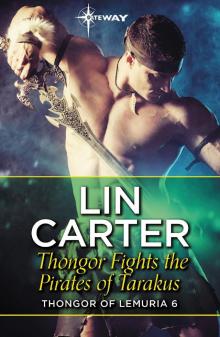 Thongor Fights the Pirates of Tarakus
Thongor Fights the Pirates of Tarakus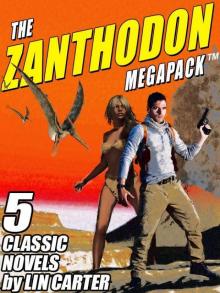 The Zanthodon MEGAPACK ™: The Complete 5-Book Series
The Zanthodon MEGAPACK ™: The Complete 5-Book Series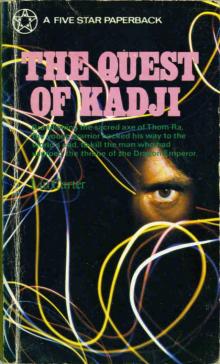 The Quest of Kadji
The Quest of Kadji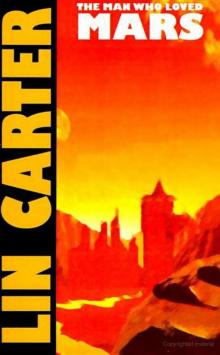 Lin Carter - The Man Who Loved Mars
Lin Carter - The Man Who Loved Mars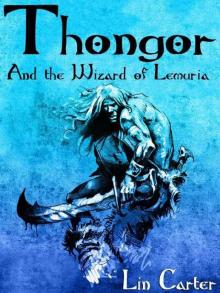 Thongor and the Wizard of Lemuria
Thongor and the Wizard of Lemuria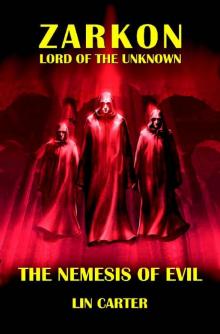 The Nemesis of Evil
The Nemesis of Evil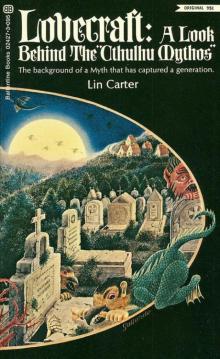 H.P.Lovecraft: A Look Behind Cthulhu Mythos
H.P.Lovecraft: A Look Behind Cthulhu Mythos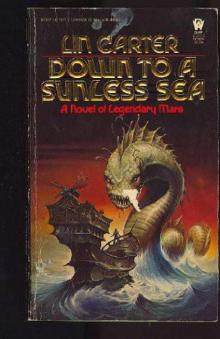 Lin Carter - Down to a Sunless Sea
Lin Carter - Down to a Sunless Sea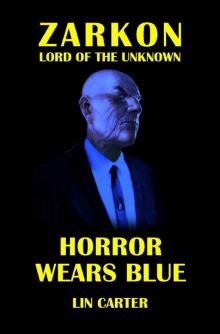 Horror Wears Blue
Horror Wears Blue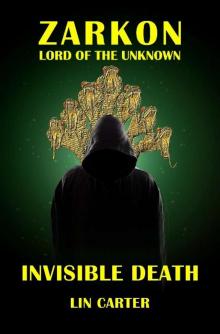 Invisible Death
Invisible Death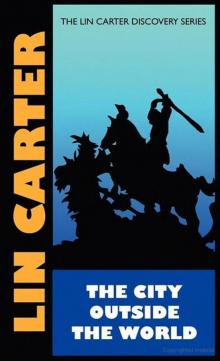 Lin Carter - The City Outside the World
Lin Carter - The City Outside the World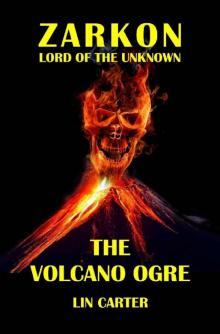 The Volcano Ogre
The Volcano Ogre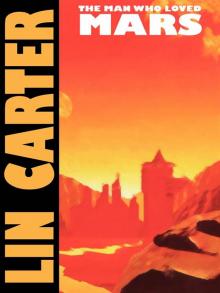 The Man Who Loved Mars
The Man Who Loved Mars